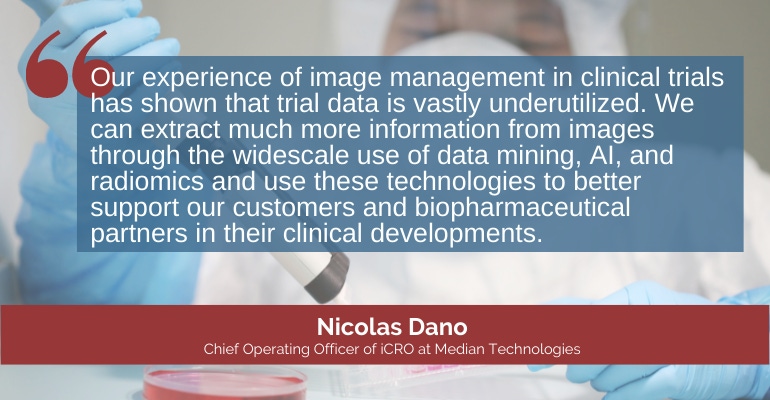June 3, 2022

Median Technologies said it plans to expand its portfolio of services with the creation of Imaging Lab, a new entity aimed at leveraging artificial intelligence (AI), data mining, and radiomics technologies to exploit imaging data from cancer trials.
Imaging Lab combines iCRO, Median’s solution for image management in the development of new cancer drugs, and iBiopsy, the company's solution for the development of software as a medical device to target the early diagnosis of cancers, especially lung cancer.
The goal of Imaging Lab, according to the company, is to optimize development plans, including facilitating go/no-go decisions to increase the success rate of clinical trials. This rate is especially low in oncology, generating an average development cost of $2.8 billion to take a new molecule to market, compared with an average of $1 billion per new molecule brought to market for other therapeutic areas.
"We are seeing a paradigm shift of pharmaceutical companies towards new drug candidates targeting patients with early-stage cancers," said Fredrik Brag, CEO and founder of Median Technologies. "The synergy between our iCRO and iBiopsy businesses is perfect to respond to this change. iBiopsy develops software as medical device, integrating AI technologies, which allow the diagnosis of diseases at a very early stage, when patients are still asymptomatic. At the same time, iCRO has extensive knowledge of image processing and its management in clinical trials. The cross-fertilization of our two businesses will enable us to leverage imaging data in conjunction with other clinical information in an unparalleled way and provide biopharmaceutical companies with tools for go/no-go decisions in trials."
Imaging Lab will provide answers in four areas that determine the success of cancer trials. The first is the selection of patients included in trials, especially inclusion of patients diagnosed at early stages of disease thanks to AI technologies. It can also predict response to therapy, measure disease progression, and evaluate the safety of drug candidates.
News of Median's new Imaging Lab comes at a time when biopharmaceutical companies are making a deeper push into the companion diagnostic space, and the industry has seen an incresing number of collaborations between the two industries. In April, for example, AstraZenca teamed up with Amoy Diagnostics. The collaboration's first project is the development of a companion diagnostic to identify prostate cancer patients with Homologous Recombination Repair (HRR) gene mutations in China, the European Union, and Japan. The next project is the development of a companion diagnostic to identify breast cancer patients with BRCA gene mutations in the EU for Lynparza (olaparib) monotherapy.
About the Author(s)
You May Also Like


